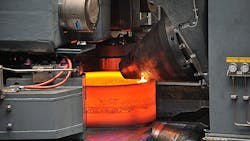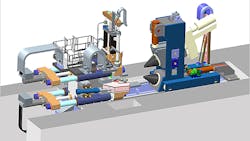Open-Die Press, Ring Mill in Dual Order for Siempelkamp
French forger L’Union des Forgerons has ordered a new open-die press and a ring-rolling mill from Siempelkamp, both to be installed as part of a new production line for nickel-based and titanium alloys at the plant in Méréville. Forgerons plans to expand its product capacity for specialty alloys in demand by aerospace manufacturers.
The value of the project was not announced. Installation of the new press will start in October 2016, followed by installation of the ring-rolling mill at the start of 2017. Full production on the new line would begin in the summer of 2017.
L’Union already produces forged parts and rolled rings in specialty and tool steels (particularly for pressurized vessels), stainless, and nonferrous alloys (aluminum, copper
alloys, titanium). The current operation consists of several hammer mills in the 600- to 2,000-kg range, along with an open-die press and a circular rolling mill. A range of heat-treating options are offered, and finished products are available as-forged, sand blasted, rough machined or custom machined.
According to Michel Discour, president and director general of the forger near Paris, "We will be able to manufacture a higher number of difficult to form materials in the future that require higher pressing and rolling forces. This includes higher-quality materials, larger dimensions, and higher working weights.
“We will be able to achieve higher outputs,” he continued. “We specialize in the flexible manufacturing of complex products; the new machines will help in this regard because we will achieve shorter delivery times."
In addition to the new open-die press and ring-rolling mill, Forgerons’ new line will have dedicated furnaces and material handling systems.
The 33/30-MN forging press will be designed as a combination open-die and ring blanking press, thus providing a measure of flexibility: in addition to producing ring blanks, Forgerons will be able to produce conventional open-die forgings weighing up to 10 metric tons. The precision lifting and centering system will ensure high accuracy for blank punching and piercing.
The ring-rolling mill that processes the ring blanks will have radial and axial forces of 4,000 kN, each, for maximum ring diameter of 2,500 mm. The mill will roll rings up to 700 mm high and weighing up to 5 metric tons.
Siempelkamp will supply the entire ring rolling machine, including the hydraulic system, electrical system, and rolling dies. While Siempelkamp will supply all mechanical equipment, Oilgear Towler will contribute the hydraulic and electrical systems for the open-die press. Glama will supply the charging manipulator, the forging manipulator, and a rail-bound forging robot that will transfer ring blanks from the press to ring-rolling mill.
The ring-rolling mill will be supplied entirely supplied by Siempelkamp, including the mechanical equipment, electrical a hydraulic systems, and the process controls.
Universal Cassette Design
According to the developer, the ring-rolling mill’s "Universal Cassette Design" makes it possible for the forger to use different main roll configurations in the same machine to increase flexibility and throughput, even for small batches, because the cassette can be exchanged within 30-50 minutes.
Long-service life may be expected too, based in the successful design of other Siempelkamp presses. Extensive FEM calculations are conducted to maximize the fatigue strength of the mechanical structural components. The housings for the axial cones, which endure high mechanical stresses, are designed as single-piece castings with no weld seams. All bearings are designed for long service life.
Siempelkamp’s SicoRoll 2.0 control software were specially developed for ring-rolling operations, and recently were updated with new features for greater precision in process control. Stored rolling models will help Forgerons during process planning. Process simulation programs take into account the machine’s threshold values, so all relevant rolling parameters are determined.
The program uses a database that stores the tool and material data, and it contains the standard rolling curves and strategies as the basis for the planning process. The calculated rolling parameters are transmitted to the machine control, which ensures the optimal ring rolling process and keeps the rolling parameters synchronized with the process.
During rolling, two lasers measure ring dimensions on a constant bases, and product temperature is monitored online. Temperature feedback is described by Siempelkamp as “an integral part” of the updated SicoRoll 2.0 software control.
The software also simulates ring blank dimensions for the forging press.
"The customer trusts our ability to supply a customized system that best meets its requirements and still fits in their budget,” commented Samiron Mondal, managing director for Siempelkamp. “One key factor is that especially for highly stressed parts, such as gears, we use as many standard components as possible. For the customer this translates into significant cost savings because maintenance and spare parts procurement are easy.”
About the Author
Robert Brooks
Editor/Content Director - Endeavor Business Media
Robert Brooks has been a business-to-business reporter, writer, editor, and columnist for more than 20 years, specializing in the primary metal and basic manufacturing industries. His work has covered a wide range of topics including process technology, resource development, material selection, product design, workforce development, and industrial market strategies, among others.
Currently, he specializes in subjects related to metal component and product design, development, and manufacturing—including castings, forgings, machined parts, and fabrications.
Brooks is a graduate of Kenyon College (B.A. English, Political Science) and Emory University (M.A. English.)


